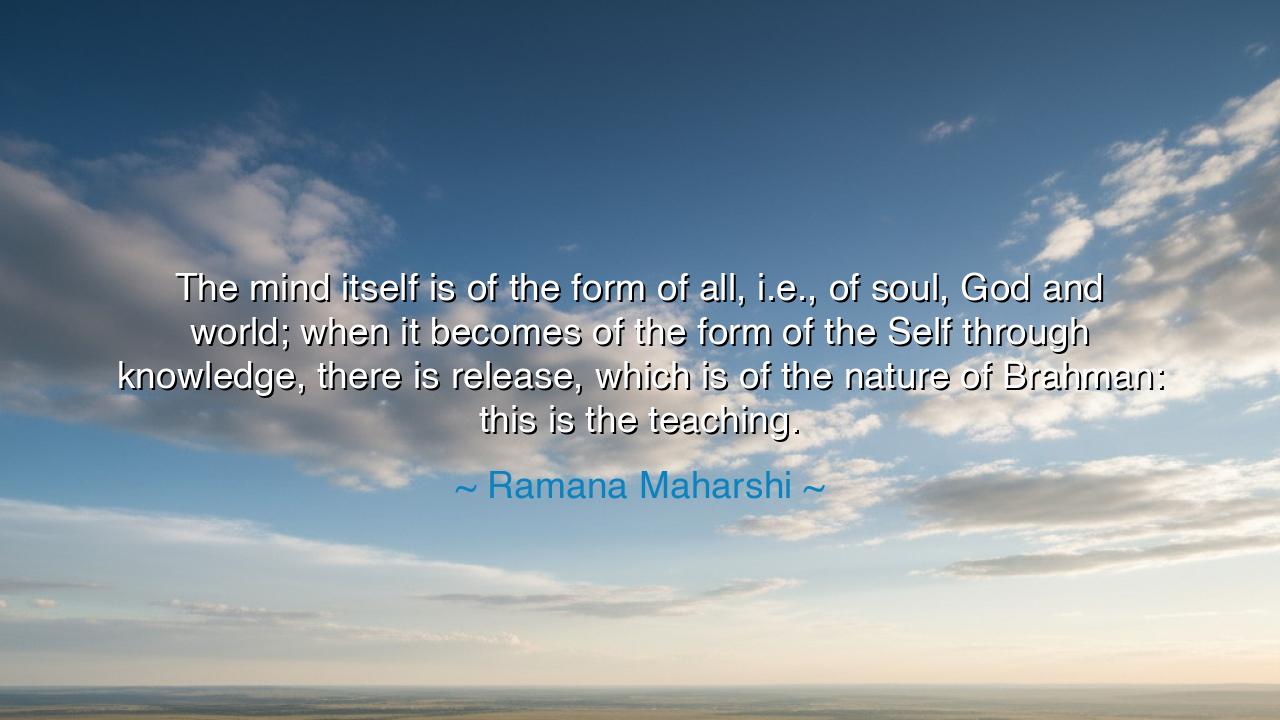
The mind itself is of the form of all, i.e., of soul, God and
The mind itself is of the form of all, i.e., of soul, God and world; when it becomes of the form of the Self through knowledge, there is release, which is of the nature of Brahman: this is the teaching.






Ramana Maharshi, the sage of Arunachala, spoke these immortal words: “The mind itself is of the form of all, i.e., of soul, God and world; when it becomes of the form of the Self through knowledge, there is release, which is of the nature of Brahman: this is the teaching.” In this declaration, we hear the distilled essence of the Upanishadic vision: that the mind is not a separate fragment of reality but a mirror of the whole. It reflects the soul, it reflects the world, it even reflects God—yet it remains restless, fragmented, until it is stilled and made one with the eternal Self. When this union is realized, the bondage of ignorance falls away, and one tastes the infinite freedom of Brahman.
The ancients often compared the mind to a lake. When stirred by winds, its surface trembles, scattering reflections into distorted shapes. But when the waters grow calm, the whole sky is mirrored perfectly. So too does the mind, agitated by desire, ego, and distraction, produce a distorted image of reality. We see the world, but in fragments; we see God, but dimly; we see the soul, but covered by veils. Yet through knowledge—not mere intellectual knowledge, but the wisdom of direct experience—the waters of the mind grow still, and the Self is revealed as identical with Brahman, the eternal ground of all being.
Consider the story of Siddhartha, who became the Buddha. His mind, like that of all men, was first captivated by the world’s pleasures, then tormented by its sufferings. He wandered, studied, and struggled, until finally, under the Bodhi tree, he stilled the turbulence of his mind and entered into perfect clarity. In that stillness, he realized that the Self was beyond birth and death, beyond pleasure and pain, and in this realization came release. His life is a living example of Ramana Maharshi’s words: when the mind is shaped by the eternal Self, one awakens to liberation.
The power of this teaching is both simple and profound. It tells us that the mind is the key to bondage and the key to freedom. When the mind identifies itself with the fleeting—status, wealth, pleasure, or even sorrow—it becomes restless and bound. But when it identifies with the eternal Self, the changeless witness of all experience, it transcends illusion. This is what Ramana calls the “form of the Self,” a recognition that we are not the body, not the thoughts, but the eternal awareness in which all arises and passes away.
This teaching also speaks to the intimate connection between knowledge and freedom. Not knowledge as accumulation of facts, but knowledge as awakening—jnana, the direct perception of the truth. Just as fire dispels darkness instantly, so does true knowledge dissolve ignorance. To know the Self is to know that the mind, the soul, the world, and God are not separate entities, but different reflections of the one reality: Brahman. And to live in this knowledge is to live in freedom, untouched by the cycles of fear and desire.
The lesson for us is radiant: the path to release is not outside us, but within. Do not seek liberation in possessions, honors, or distant heavens. Turn inward. Watch the mind with patience, calm its turbulence through self-inquiry, meditation, and discipline, until its form dissolves into the form of the Self. When the question “Who am I?” is pursued to its root, the answer dawns not as words but as direct experience: you are not this fleeting body or restless mind, but the timeless Brahman itself.
Practical action lies before us. Begin by observing the mind each day. Notice its desires, its fears, its distractions—but do not become them. Sit in silence, practice self-inquiry, and let your awareness turn inward. Study the lives of those who have realized truth, like the Buddha, Shankara, or Ramana himself. Above all, cultivate humility, patience, and devotion to truth. For as the waters of the mind grow clear, you will discover within yourself the same eternal radiance that sages and saints have spoken of for millennia.
Thus Ramana Maharshi’s words, though spoken in the quiet hills of Arunachala, resound across all ages: the mind is the reflection of the world, the soul, and God; but when it is stilled and made one with the Self through true knowledge, then the door to eternal release opens, and the seeker realizes that he was always, and forever will be, Brahman. This is the teaching.






AAdministratorAdministrator
Welcome, honored guests. Please leave a comment, we will respond soon